City of Heroes is a massively multiplayer online role-playing game...but don't hold that against it. If you've tried one of these types of games lately, then you know they can be clunky, hard to get into, slow-paced, and prohibitively time-consuming. You're also probably accustomed to how they start you off as some pathetic wimp who literally can't walk and chew gum at the same time and must spend hours swinging at snakes and rats before he or she gains any reasonable amount of proficiency as an adventurer. But City of Heroes isn't like this. It lets you create your own unique superhero who starts off strong and grows much stronger as he or she keeps taking down Paragon City's ruthless criminal element. The game is attractive and accessible and features big, fast-paced battles. Above all, it succeeds at bucking most of the genre's bad trends, and this is an amazing accomplishment. Yet, City of Heroes is so streamlined that it actually feels rather stripped-down in some respects; admittedly, there's really not much more to the game beyond battling lots and lots of packs of computer-controlled bad guys. So it might not have what it takes to keep you glued to your PC for the next five years (especially not at $15 a month after the first 30 days), but for a while, it sure is fun.
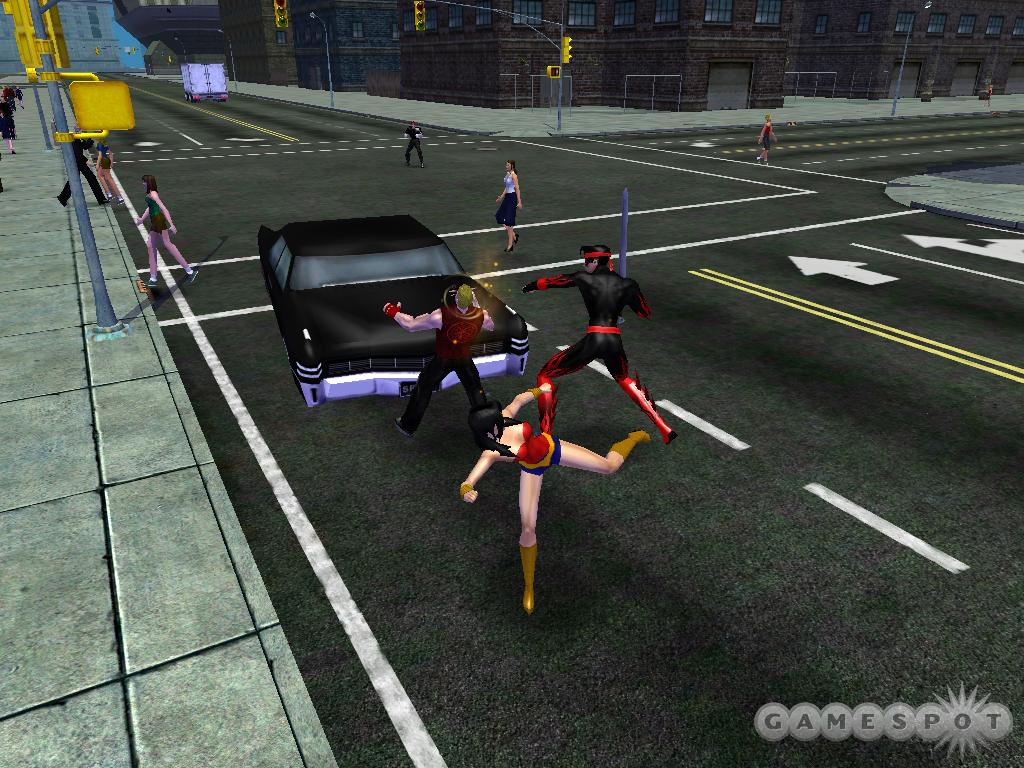
The best thing about City of Heroes is that it genuinely offers the thrill of discovery--something that is fundamentally uncommon in gaming, since most games are closely modeled on established genres. Actually, much of this thrill may be derived from the game's elaborate, extremely entertaining character-creation process, which allows you to craft a convincing replica of any of the most famous (and not-so-famous) superheroes in the Marvel and DC canon. As well, there's a good chance you can rip off the look of your favorite video game character or Hollywood action hero. However, you can always come up with something completely off-the-wall and original, if you'd prefer.
There are tons of different face masks, outfits, body types, little frills, and colors to choose from, and the consequence is that most all the player characters running around in City of Heroes look truly unique. After a while, you'll learn to pick out the discrete elements that make up each character. For instance, you can make a cigar-chomping cowboy with huge, robotic arms and medieval armored leggings, but you might see some less-ridiculous characters running around sharing some of the same details or body parts. And while you can make everything from huge, sinister-looking robots to slinky gals in hot pants, it must be noted that the difference between any two characters sometimes tends to be only skin-deep (or skin-equivalent-deep). Furthermore, there's a shocking omission: There are no capes. You'll see guys that look just like Superman and Batman running around, capeless. That's just wrong.
Even though it doesn't affect gameplay, choosing your appearance is very important, because once you settle on it, it's not going to change during the course of your character's existence (for the time being, anyway). That's actually one of the problems with the game. In most online RPGs, a character's experience is readily apparent, at-a-glance, due to the elaborateness of his or her armor or weapons or something similar. In City of Heroes, you'll be able to discern higher-level heroes by their abilities to fly, teleport, superjump, and so on, but all heroes are created equal-looking.

The most important decision you make when creating your character is your choice of superhero archetype, of which there are five. There's the blaster, a ranged specialist; the tanker, an extremely hardy melee fighter; the scrapper, a fast and powerful close-range combatant; the defender, who provides healing and support; and the controller, who provides crowd control and support. Within these five archetypes, there are a variety of distinctive options. As a result, you'll choose one respective option from a variety of primary and secondary skill paths. So, for example, you can be a blaster who specializes in assault rifles and fire spells, a scrapper who specializes in broadswords and regenerative skills, or a controller who specializes in gravitational forces and radiation. All in all, you'll be able to use this open-ended system to create a wide variety of interesting, multitalented characters whose powers are either plausible within the context of a superhero game or are just utterly absurd--which is cool too.
The character combinations are extensive and fun to experiment with, but they are limited. And, once you settle on your starting choices, you're stuck with them. Indeed, as you gain experience levels from fighting and are prompted to choose new skills or are prompted to choose different abilities to enhance, you'd better make your choices count, because there's no going back after you make them. Fortunately, there aren't many "wrong" choices to be made here. All the archetypes are desirable in groups (blasters are especially common in the game, though), and there are clear, concise descriptions available for all the skills in the game, so you can plan your character out in advance to avoid those skills that don't sound compatible with your playing style. Invariably, you'll get "class envy" and will want to try out a completely different character from the one you've been playing, but that's where a lot of the fun in City of Heroes comes from.
We've spent a long time going over the character-creation portion of City of Heroes, because, the truth is, you'll probably spend a lot of time there yourself. Once in the game, things get considerably less complicated. You'll start out in a brief interactive tutorial (which, unfortunately, is exactly the same each time you create a new character), where you'll learn the basics involved with moving around, taking on tasks from non-player characters, running from point A to point B using the handy waypoints on your compass, beating up thugs, gaining experience points, and using "enhancements" (for bolstering your skills) and "inspirations" (an abstract version of magic potions). This tutorial, for better or worse, does cover much of what City of Heroes' actual gameplay has to offer. Other online RPGs, though they're ultimately combat-oriented just like City of Heroes, at least offer diversions in the form of trade skills, shopping, and player-versus-player elements. On the other hand, City of Heroes is squarely focused on player-versus-environment action.
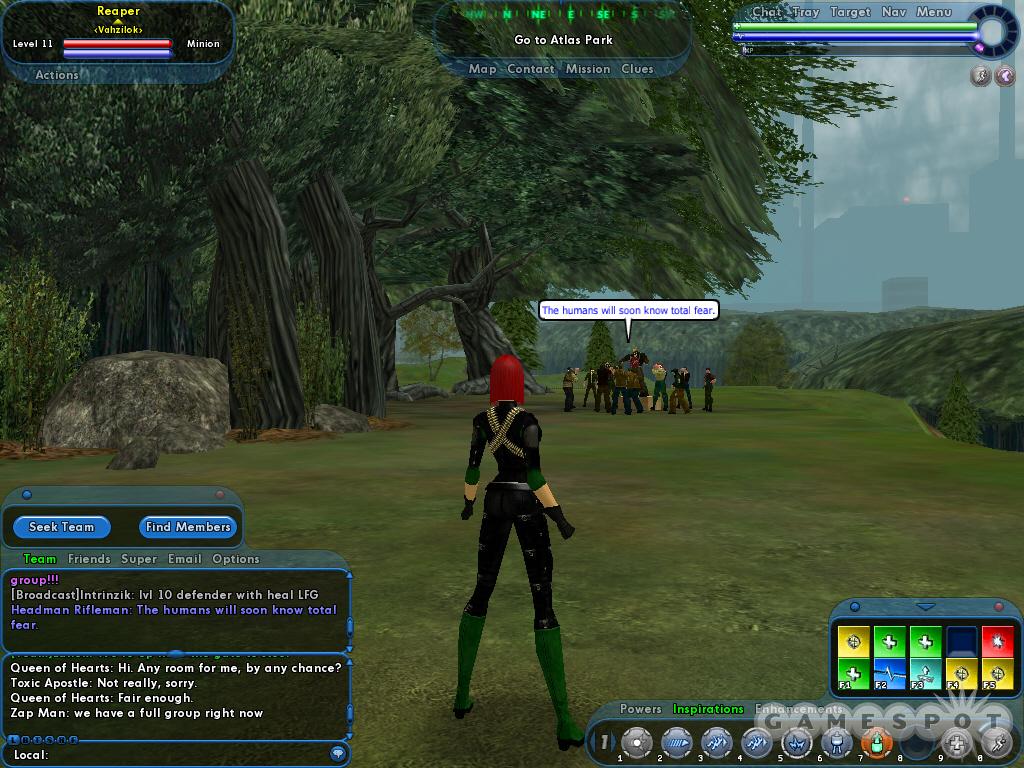
Fortunately, the combat works very well. One of the great things about City of Heroes is that it effectively allows for some very large and dynamic skirmishes. The various effects of different weapons are attractive, powerful-looking, tactically significant, and easily distinguishable. Your enemies, meanwhile, exhibit some shred of intelligence sometimes (they'll try to flee when overwhelmed, or they'll try to flank you when they outnumber you, for instance), which is more than can be said of enemies in most such games. Another nice touch is that you'll encounter your foes in context. Thugs can be seen mugging civilians or loitering by parked cars, sinister magicians can be found conducting bizarre rituals, mutant fiends can be found plotting Paragon City's destruction, and so on.
Player groups may consist of up to eight players, which is larger than average. Enemies are rarely fought one at a time and, instead, tend to congregate in large packs, sometimes of around a dozen or two. Characters of all archetypes learn a variety of useful combat abilities that can affect multiple enemies in an area of effect, debilitate or incapacitate opponents, effectively finish off fleeing foes, cause dissension in enemy ranks, and more. Managing a full party's worth of these diverse and interesting powers isn't a chore, but balanced groups of players who plan carefully will be able to defeat much stronger opponents than usual, resulting in a faster gain of experience levels. In City of Heroes, you want to keep leveling up. The pace of level gain noticeably slows down after about the 10th level, but by then, you'll have a significant variety of powers to use in battle, which should help keep you involved in the proceedings.
Your character begins with several basic skills, so things start simple. You have health points, which you lose as you take damage, and you have endurance points, which are drained as you use your skills. More-powerful skills tend to cost more endurance and take longer to recharge between uses, so you'll need to manage your endurance bar during prolonged encounters (and between them). There tends to be little downtime between fights, though characters all have a rest skill that lets them quickly regain all their health and endurance, and inspirations (which are frequently earned from defeated foes) can be used to instantly restore large amounts of either resource.
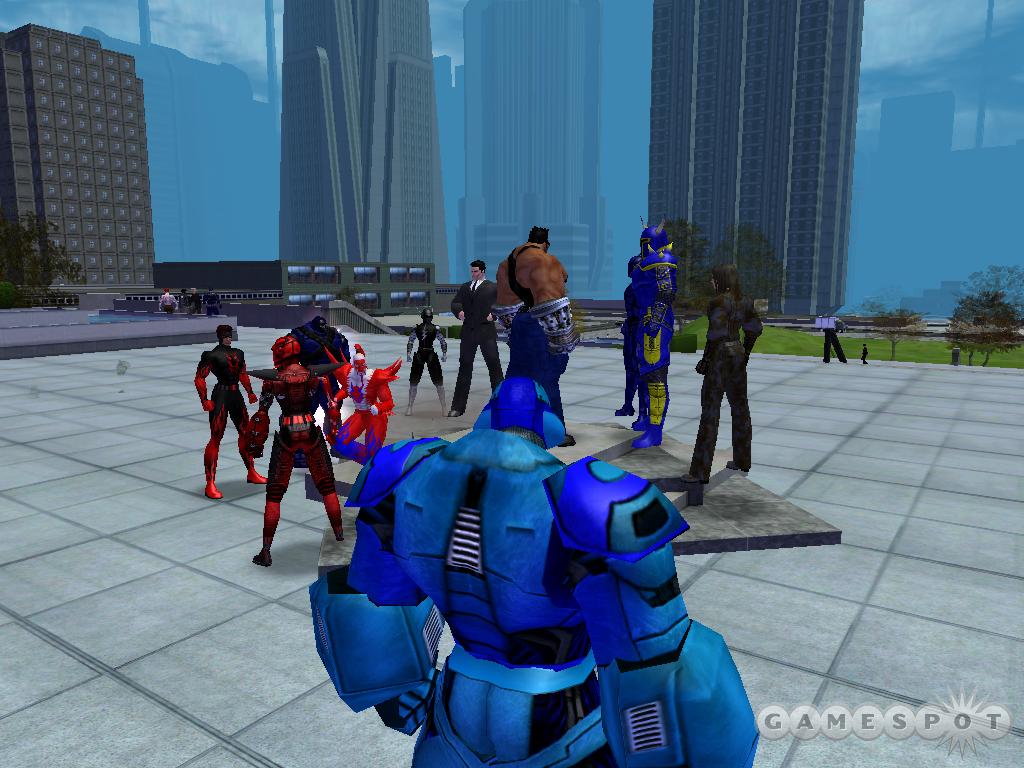
The game's interface is clean, simple, streamlined, and functional. It's intuitive to learn and great to use. Finding player groups is extremely easy. Just toggle the button to indicate that you're looking to join a team, and chances are that someone from among the game's already-dense player population will send you an invite moments later. There's no pretense in City of Heroes. Quick greetings and curt good-byes are exchanged as players come and go, and there's a common understanding that teamwork in the game is both for fun and for gain but not necessarily for complication or drama. For the occasional bouts of genuine social interaction, City of Heroes offers some clever provisions, such as the ability to play rock-paper-scissors or flip a coin to settle a dispute.
In other online RPGs, you might argue with your group over who should get to take the loot from a slain beast. But, apart from inspirations and skill enhancements, there's no inventory and no looting in City of Heroes. This is a calculated design choice that yields mixed results; as mentioned, the bad part is that your character won't get to show off any hip, new equipment. But the good part is that gameplay is completely alleviated of the petty squabbles common in other online RPGs. You do earn "influence" in City of Heroes, which basically serves as money, and you can use it to buy enhancements or inspirations from merchants, although this isn't necessary. City of Heroes' characters are entirely self-reliant.
The skill-enhancement system, though it's limited, is quite well designed. Enhancements, which are randomly acquired as you defeat foes, need to be of a particular level to be effective for your character, so there's always cause to find, buy, or trade for new and better enhancements as your character gains experience. Enhancements of the same variety (say, ones that boost damage) can be merged to augment their overall potency, so you needn't just throw away old ones. Some especially effective enhancements are specific to certain types of characters, so City of Heroes does encourage you to seek out and trade for rare, useful items. Again, though, there's an issue in that while these enhancements are beneficial to you, they're completely transparent to everybody else. Another player isn't going to be able to tell when your energy blast is dealing slightly-greater-than-usual damage from slightly-longer-than-usual range.
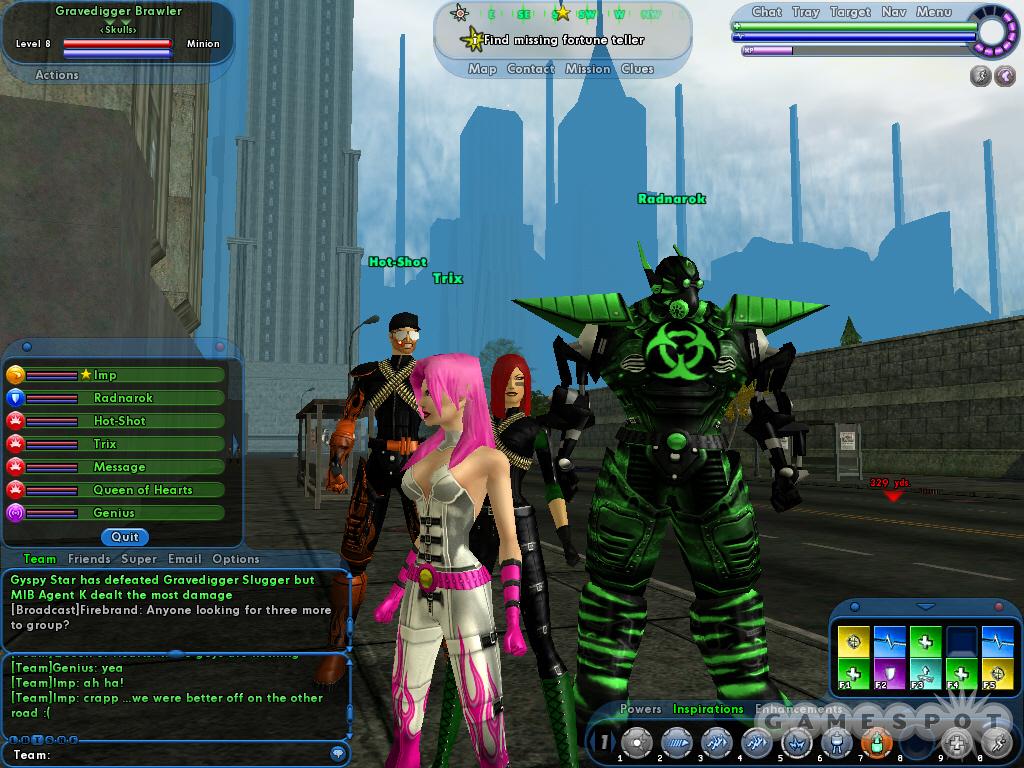
The enhancement system is good, overall, and City of Heroes has a few other inventive features along these lines. Once characters attain the 10th level, they may opt to make other, lower-level characters their sidekicks. These characters will then be able to fight at a level commensurate with their mentors, as long as they remain in the general vicinity. This system is designed for those who wish to play together but aren't close enough in experience level to be able to practically take on the same types of opponents. You can also form and organize player guilds, or "supergroups" (as they're called here), and you can designate team colors and insignias. Furthermore, you can appoint officers and such. You can also explore Paragon City for different personal contacts, who'll send you on various tasks and quests, which will take you into dilapidated warehouses, sewers, office buildings, and generally all around town. The questing is straightforward, but it is a worthwhile diversion from just stomping about city zones, looking for trouble. In fact, the questing is pretty much the only diversion from routine crime-fighting.
The game looks quite impressive, overall. Though the character models aren't terribly detailed, animations look great (though they're a bit limited); the city streets and other areas look good; and the game's brightly colored special effects look terrific. The game engine also realistically renders various real-world textures, such as leather or steel, and is able to push lots of characters onscreen without any significant impact to the frame rate. City of Heroes also sounds good, though the audio mostly consists of the various sound effects used for numerous special abilities. You'll hear little more than a few grunts from player characters, and the game's musical score is very sparse and only briefly kicks in when you enter a new area.
One of the nice things about City of Heroes is that the world of the game--which is set entirely in the larger-than-you'd-expect Paragon City--looks alive. There's a lot of foot and vehicular traffic on the streets, and civilians in distress are seemingly around every corner. Foes lurk in logical places and don't just wander around aimlessly. The thing is, a lot of this atmosphere is pure window dressing. If you stand right in the street and let a car careen right into you, you'll see yourself just kind of get pushed aside as the vehicle drives on by as if nothing happened. Civilians thank you profusely when you beat up bad guys in their vicinities, but the effect grows repetitive. And if you've played Irrational Games' outstanding superhero RPG, Freedom Force, then you'll resent the inability to uproot Paragon City's street lamps for use as clubs. Actually, you can't cause any damage (intentional or otherwise) to the environment, which might disappoint those expecting to wreak real havoc in the game.
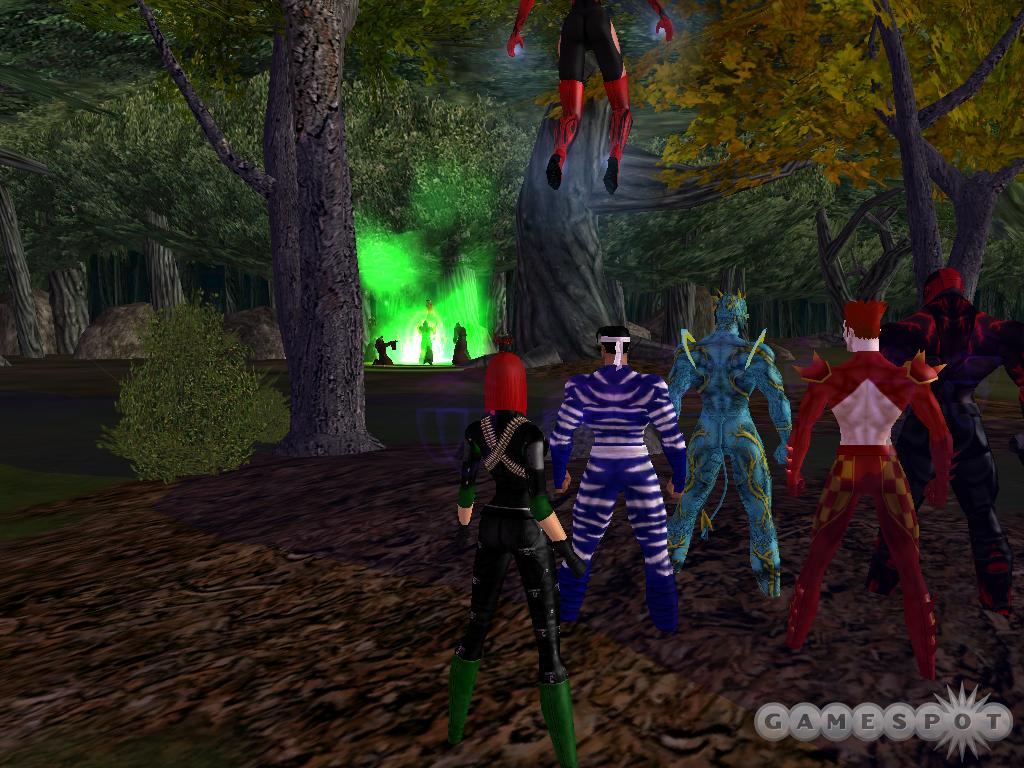
These sorts of omissions are representative of the City of Heroes experience, overall, both for better and for worse. It's great at what it does, but it doesn't do as much as you'll wish it did. Specifically, this game has many excellent ideas that are well implemented, but a lot of detail and a lot of the richness that's given other online RPGs their incredible longevity also seem to be missing. Recently, publisher NCsoft and developer Cryptic Studios announced the predictably named City of Villains expansion pack, which will ostensibly add some new layers of depth to the gameplay. And while the developers have demonstrated that they can introduce unique, story-driven elements into the gameworld (alien flying saucers invaded Paragon City in the final stages of the beta leading up to the game's release), the core gameplay doesn't seem like it's going to evolve all that much in the immediate future. So, depending on how much time you're willing to spend with the different archetypes, you may or may not be willing to pay the monthly fees past the first 30 days.
But let's consider that point in perspective. A month or two's worth of quality multiplayer entertainment is more than you'll get from the typical game. The bottom line is: If you like the idea of inventing your own superhero and using him or her to beat down droves of evildoers--preferably alongside a number of other similarly-minded brethren--then rest assured that City of Heroes will deliver this to you. It's a refreshingly focused online role-playing experience and is an entertaining, polished game that, unlike so many others, manages to deliver on the underlying promise of an excellent concept.